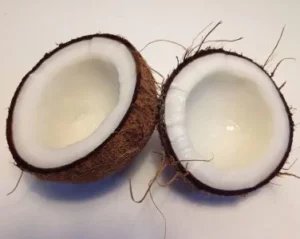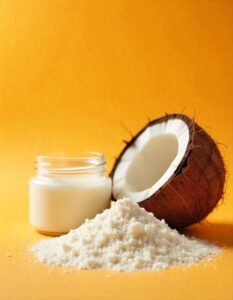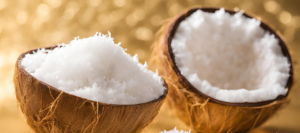The Science Behind Coconut Oil: Debunking Myths and Revealing Facts

Coconut oil has gained immense popularity in recent years, becoming a staple in many kitchens and beauty regimes. Its unique composition and numerous health benefits have made it a superfood of sorts. However, with its rise in popularity, a lot of myths and misinformation about coconut oil have also emerged. In this article, we will delve into the science behind coconut oil, separating fact from fiction.
Understanding the Composition of Coconut Oil
Coconut oil is derived from mature coconuts, specifically from the meat or kernel of the coconut. It is composed mainly of saturated fats, making up approximately 90% of its fatty acid profile[^1^]. These saturated fats are primarily medium-chain triglycerides (MCTs), which are believed to have different metabolic effects compared to long-chain triglycerides (LCTs)[^2^][^3^].
Debunking Myth: Coconut Oil is Unhealthy Due to Its High Saturated Fat Content

Coconut oil has often faced criticism for its high content of saturated fats, which have been associated with an increased risk of heart disease. However, recent scientific studies have challenged this notion. While it is true that saturated fats can raise LDL (bad) cholesterol levels, coconut oil’s impact on heart health may be more complex[^4^][^5^].
Studies have shown that the MCTs in coconut oil increase HDL (good) cholesterol levels and improve the ratio of total cholesterol to HDL cholesterol[^6^][^7^]. Moreover, MCTs are easily metabolized by the liver and converted into energy, making them less likely to be stored as fat[^8^]. It’s worth noting that the type of saturated fat in coconut oil differs from that found in animal sources.
Fact: Coconut Oil Can Aid in Weight Loss and Metabolism

One of the most widely publicized health benefits of coconut oil is its potential to aid in weight loss and boost metabolism. Several studies have suggested that the MCTs in coconut oil may increase energy expenditure and promote fat oxidation when compared to LCTs[^9^][^10^].
Furthermore, incorporating coconut oil into a balanced diet can help increase feelings of fullness and satiety, reducing overall calorie intake[^11^]. However, it is important to note that while coconut oil may have a modest impact on weight loss, it is not a magic solution and should be consumed in moderation as part of a well-rounded diet.
Debunking Myth: Coconut Oil is a Cure-All for Various Diseases

The internet is filled with claims about coconut oil being a panacea for various health conditions, from Alzheimer’s disease to cancer. However, it’s important to separate fact from fiction.
While some studies suggest that the MCTs in coconut oil may have potential benefits for brain health, particularly in individuals with Alzheimer’s disease[^12^], there is currently insufficient evidence to support the notion that coconut oil can prevent or cure this condition. Similarly, claims of coconut oil’s benefits in treating cancer are not supported by rigorous scientific evidence[^13^].
Fact: Coconut Oil is Beneficial for Skin and Hair Health

Coconut oil boasts a range of benefits for your skin and hair due to its unique properties. Its high saturated fat content helps to strengthen the skin barrier, locking in moisture and reducing water loss[^14^]. This makes it an effective natural moisturizer, especially for dry or sensitive skin.
Moreover, coconut oil has been found to possess antimicrobial properties, thanks to its lauric acid content[^15^]. This can help combat certain skin conditions, such as acne and fungal infections. Additionally, many people claim that coconut oil can improve the condition of their hair, making it smoother and shinier.
Conclusion
The science behind coconut oil reveals a range of benefits, as well as dispels some of the myths surrounding its consumption and application. While coconut oil’s saturated fat content may still spark debate, it is increasingly recognized that its unique composition, particularly the presence of MCTs, can have positive effects on health when consumed in moderation.
As with any topical or dietary product, it’s essential to consider individual needs and consult a healthcare professional before making significant changes to your routine. So go ahead and enjoy the goodness of coconut oil, whether in your cooking, beauty rituals, or as part of a holistic lifestyle.

References:
[^1^]: Coconut composition and potential health effects
[^2^]: Measurement of branched-chain fatty acids in plasma by chemical ionisation gas chromatography-mass spectrometry (GC-MS)
[^3^]: Medium-chain triglycerides (MCTs): Uses, Side Effects, Interactions, Dosage, and Warning
[^4^]: Dietary Fats and Cardiovascular Disease: A Presidential Advisory From the American Heart Association
[^5^]: Coconut oil consumption and cardiovascular risk factors in humans
[^6^]: Effects of dietary coconut oil on the biochemical and anthropometric profiles of women presenting abdominal obesity
[^7^]: Medium chain triglyceride oil consumption as part of a weight loss diet does not lead to an adverse metabolic profile when compared to olive oil
[^8^]: Medium-chain triglycerides improve cognitive function in intensively treated type 1 diabetic patients and support in vitro synaptic transmission during acute hypoglycemia
[^9^]: Weight-loss diet that includes consumption of medium-chain triacylglycerol oil leads to a greater rate of weight and fat mass loss than does olive oil
[^10^]: Acute effects of medium-chain triglyceride consumption on cognitive function in healthy adults
[^11^]: Effects of dietary coconut oil on the biochemical and anthropometric profiles of women presenting abdominal obesity
[^12^]: Dietary ketosis enhances memory in mild cognitive impairment
[^13^]: Virgin coconut oil, where it stands now and its future prospects as a functional food
[^14^]: Effect of mineral oil, sunflower oil, and coconut oil on prevention of hair damage
[^15^]: Antimicrobial property of lauric acid against Propionibacterium acnes: its therapeutic potential for inflammatory acne vulgaris



